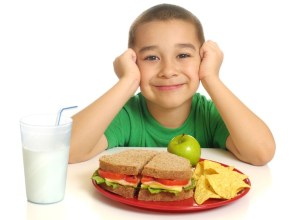
Stunting and being underweight are the most common nutritional disorders afflicting South Africa’s preschool children, with the National Food Consumption Survey (2005) showing that nearly one out of 10 children (8.6%) aged 4 – 6 years are underweight and four out of 20 (16.4%) are stunted. Conversely, being overweight is also a major concern, affecting nearly one out of 10 (8.3%) preschoolers.
It’s against this backdrop that the Department of Health and Department of Social Development, along with Unicef, the Association for Dietetics in South Africa (Adsa), the Consumer Education Project of Milk SA (Cep) and the Consumer Goods Council of South Africa (CGCSA), embark on National Nutrition Week 2010 under the theme "Healthy Eating for Preschool Children".
Four key messages
The campaign takes place from 9 to 13 October 2010 and specifically targets preschoolers aged 4 – 6 years as well as staff at crèches and nursery schools. This year the campaign will communicate four key messages, including:
1. Make starchy foods the basis of a child’s main meals (including pasta, maize meal, bread, rice, potatoes and fortified starches)
2. Children need plenty of vegetables and fruit everyday
3. Children need to drink milk everyday and
4. Children can eat chicken, fish, meat, eggs, beans, soya or peanut butter everyday.
The campaign aims to encourage healthy eating among preschoolers to ensure adequate nutritional intake, essential for positive growth and development and the establishment of long-term healthy eating behaviours.
“Deficiencies in key micronutrients are also prevalent in this age group, with more than half of them (63.6%) being vitamin A deficient and nearly half (45.4%) having a zinc deficiency. These statistics highlight the urgent need for interventions that optimise eating patterns and therefore the growth and development of our children. It’s critical that these positive eating behaviours are established at a young age, so that they continue into adulthood,” says Lynn Moeng, Director: Nutrition at the Department of Health.
Bone development
Maretha Vermaak, CEP dietician, reinforces this point saying bone formation during childhood and adolescence determines bone health later in life.
“Childhood is the most important time for bone development. Optimal bone health requires the consumption of calcium from dairy and physical activity, among other things, so it’s imperative that children drink at least three glasses of milk every day and get plenty of physical exercise. Cheese, yoghurt, maas and flavoured milk are also good sources of calcium and can be taken in place of milk,” Vermaak explains.
"Good nutrition practices in early childhood lay the foundation for healthy eating patterns for life. By the age of 3 years most children can feed themselves, but teachers and families should continue to watch and encourage children at meal times,” says René Smalberger, Adsa president.
“Meals must include a variety of foods, so as to provide the nutrients needed by the child's growing body. Breakfast is essential and children attending school should take along a healthy packed lunch. Families can take advantage of dinner time as an opportunity to get together and enjoy a balanced meal," concludes Smalberger.
National Nutrition Week is also of importance to the CGCSA and food industry members it represents, in improving the health of all South Africans. “We fully support this initiative, as healthy eating habits of preschool children play a critical role in ensuring the provision of essential nutrients in the early stages of development, for the longer term health and wellbeing of our nation,” says the CGCSA’s Food Safety Initiative (FSI).
Teacher Support Pack
To support preschool teachers in educating children around healthy eating, the Department of Health and the CEP, with the assistance of stakeholders, have developed a Teacher Support Pack, filled with information designed to help teachers plan activities and lessons on nutrition. These may be used during National Nutrition Week or at other times of the year to reinforce the key messages.
A limited number of support packs will be distributed to preschools around the country and it can also be downloaded from the department’s website.
National Nutrition Week is an annual initiative by the Department of Health and has been implemented across the country for more than 10 years. It aims to educate children, parents and teachers about the benefits of eating a healthy, balanced diet in an effort to address the many nutritional deficiencies affecting South Africa’s children.
FACT BOX
The 1999 National Food Consumption survey (NFCS) showed that:
- Most children 1 – 9 years of age consume a diet low in energy, with poor protein quality and micronutrient density. One out of two children had an intake of less than half the recommended level for vitamins A, B6, and C, riboflavin, niacin, calcium, iron, and zinc.
- A fifth of children 1 – 9 years consumed less than half of their required energy needs and that almost half of the children had an energy intake of less than two-thirds of their daily energy requirements
- Calcium is one of the nutrients shown to be severely lacking in the diets of children aged 1 – 9 years. The survey showed that half of children were found to have an intake of less than 50% of the recommended level. By consuming three servings of dairy per day (200 ml full-cream milk plus 30g cheese plus 100ml yoghurt), approximately 90 % of the daily requirements of children aged 4-8yrs for calcium , will be obtained
- Vitamin A is lacking from the diet of many children aged 1-9 years. Vitamin A helps to maintain the health of many types of cells, ensure normal functioning of the immune system, the visual system as well as proper growth and development.
- South African children only consume between 41% and 63% of the iron they need. Low iron intake causes behavioural changes, delayed psychomotor function and impacts negatively on cognitive function and intelligence
For more information visit the websites of the Department of Health, the Association for Dietetics in South Africa (Adsa), the Consumer Education Project of Milk SA (Cep) and the Consumer Goods Council of South Africa (CGCSA).
- (Compiled by Birgit Ottermann, Health24, October 2010)
Read more:
Top 10 healthy eating tips for kids
Diets for preschool kids
Menus for preschool kids
Kids' diets need an overhaul
Complete our 2010 Health of the Nation survey and stand a chance to win an electronic scooter or cash!




 Publications
Publications
 Partners
Partners















